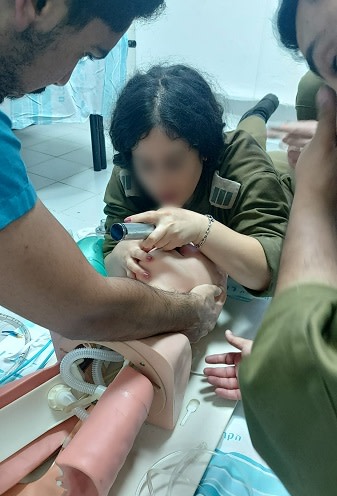November 29, 2023 – Over the past month, medical teams at Rambam Health Care Campus (Rambam) in Haifa, Israel has been providing essential training and simulations in life-saving techniques to medical officers in the field and at the hospital.
As most Israeli Defense Force (IDF) medical teams are comprised of reservists, refresher courses are as essential for them as for any other healthcare professional. On the frontlines of medical care since 1948 and the designated healthcare provider for the IDF Northern Command, Rambam has accumulated vast experience and expertise in treating severely injured patients, with the lowest mortality rates in the country. As the war rages on, Rambam has remained at the forefront of addressing all critical healthcare needs in the North. Hence, the hospital receives numerous requests from the IDF to train combat unit physicians, medics, and paramedics in life-saving interventions for mass casualty situations and scenarios that duplicate real-time frontline conditions.
The demand for this vital training has increased due to current hostilities in Northern Israel. Hence, Rambam recently reached out to the Jewish community abroad to help fund these crucial efforts. The Jewish Federations of North America (JFNA) has generously shown an outpouring of support, enabling an increased number of IDF soldiers to be fully trained for any emergency situation that may arise.
This is not the first time the Jewish Federations have been involved in supporting initiatives at Rambam. Rambam has a long collaboration with the Combined Jewish Philanthropies (CJP) in Boston, which includes the Haifa-Boston Connection, a well-known community project. Earlier this year, the CJP awarded hospital employees and children from the local Ethiopian community with Haifa-Boston Scholarships towards their academic studies.
Now, with the help of the JFNA, Rambam has implemented the advanced training initiative during the war. By using “smart manikins,” IDF medical personnel can visualize realistic simulations as they would unfold in the field, enabling them to respond to the scenarios as though they were being played out in real time. Medical manikins representing all ages are used, enabling simulations providing the opportunity to respond to ever-changing situations, making adjustments as they go, according to their patient’s developing condition and response. As a result, trainees are better able to respond quickly and accurately when faced with new developments on the battlefield.

Among the teams conducting the training sessions are the staff of the Cheryl Spencer Pediatric Emergency Department team. “There is an incredible response from both staff and soldiers alike,” says Dr. Idit Pasternak, the director of the Pediatric Emergency Department, who assisted with the training. “We are doing as much as we can to help.”
